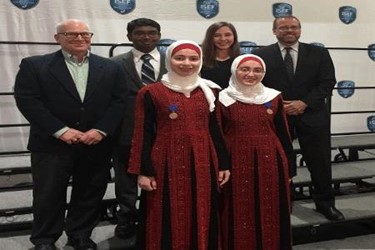DCAT Awards Scholarships At Intel ISEF 2017

Winning Projects Design New Technologies to Benefit Human Health
The Drug, Chemical & Associated Technologies Association (DCAT) is proud to announce the winners of three scholarships presented at the Intel International Science & Engineering Fair (Intel ISEF) Special Awards Ceremony on May 18th in Los Angeles, California. As a Special Awards Organization, DCAT had the opportunity to award $3,000 to three selected projects, as well as $2,000 to each of the respective winners’ high schools to support STEM education.
Each year, Intel ISEF brings together over 1,800 high school students from more than 75 countries, regions and territories to showcase their independent research and compete for an average of $4 million in total prizes. This was the first year that DCAT participated as a Special Awards Organization sponsor.
“This event brings together a cross section of cultural diversity that aligns with DCAT’s membership,” said Scott Price, Chairperson of DCAT’s Science & Scholarship Committee and Vice President, Sales at Ren-Pharm International, Ltd. “These students are exactly the type that our member companies will want to hire in the future. They have the skills and talents our members are looking for.”
Prior to the event, DCAT’s Science and Scholarship Committee combed through hundreds of project abstracts to establish a target list of over 20 candidates to be judged at the fair. Mr. Price and John Orr, PhD, a committee volunteer and Managing Advisor at Rondaxe Pharma, traveled to Los Angeles to evaluate the science fair exhibits, interview the students, and determine the winners.
“The award recipients were selected for their work, which demonstrated the identification of a problem that affects the lives of others and involved the creative design of a new technology to solve the problem with the potential of providing benefits to other people,” said Dr. Orr.
This new scholarship initiative allows the DCAT organization to invest in the future of science by supporting young scholars who represent the geographic regions and areas of study that reflect the global membership of DCAT.
And the Winners are…
Ayah Hayel Shehadeh and Bayan Osama Abu Alragheb, both juniors at Al-Hasaad Al-Tarbawi School in Amman, Jordan, won for their project Leading the Environment with Less Lead, Nano-Structured Jordanian Kaolinite for the Removal of Lead from Industrial Waste Water. Motivated by the environmental impact of increased heavy metal water pollution in their country as well as the scarcity of potable water, they developed a method to extract lead from water using nano-structured Jordanian kaolinite clay treated with aspartic acid. In the future, they hope to apply this process to the removal of other heavy metals and would like to explore the development of treated kaolinite capsules to be taken in an emergency following the accidental ingestion of contaminated water.
Devanik Biswas, a junior at Stanton College Preparatory High School in Jacksonville, FL, won for his project, Fabrication of a Novel Nanoporous Hybrid and Multi-Layer Membrane for a Drug Delivery System. He was motivated to develop a drug delivery system with a long-term release profile for ophthalmic diseases because his grandmother developed glaucoma and went blind due to overuse of eye drops. He spent his 2016 summer break commuting 4 hours a day, 5 days a week to the University of Florida in Gainesville where he developed a hybrid multi-layer membrane containing polycaprolactone microbeads that contain the drug sandwiched between two layers of nanofibers.
Drug release testing indicated the potential of long-term drug delivery with minimal burst-release. This technology has the potential to alleviate the deleterious effects of eye drop use.
Zoe Weiss, a sophomore at Lakeside High School in Atlanta, GA won for her project An Early Tri-Biomarker Sputum Diagnostic for Cystic Fibrosis in the Developing World. Motivated to improve public health in developing countries, she created a rapid, low cost, and temperature independent cystic fibrosis diagnostic that outperforms the sweat test and genetic mutation test counterparts in terms of sensitivity, specificity and accuracy. She plans to outreach to the Cystic Fibrosis Foundation to explore the viability of a commercial product for developing countries.
About DCAT
As a not-for-profit, member-supported business development association for the global pharmaceutical manufacturing industry, the Drug, Chemical & Associated Technologies Association (DCAT) is committed to providing programs, events and services that help our members expand their network of customers, suppliers and colleagues in the industry. Founded in 1890, DCAT is the industry’s premier business development association whose membership is comprised of companies that manufacture, distribute or provide services to the pharmaceutical, chemical and related industries. With over 450 corporate members, DCAT is headquartered in Robbinsville, New Jersey.
Source: Drug, Chemical & Associated Technologies Association
